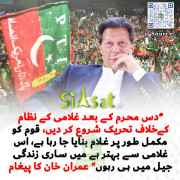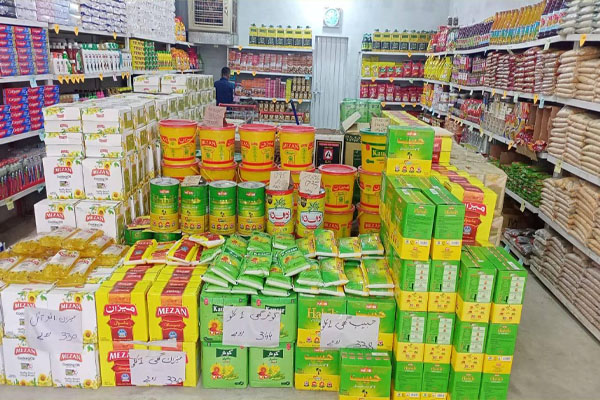walayti jatt
Politcal Worker (100+ posts)

For the last 40 years, The U.S.-Pakistan relationship has been distorted through the lens of Afghanistan. Although it remains unclear exactly how or when the United States' relationship with Afghanistan will change, the U.S. will reduce its footprint on Afghanistan and have a different kind of engagement in the future. It is important for Pakistan to recognize that if the Taliban "wins," the United States will largely hold Pakistan responsible.
All the many sacrifices of the Pakistan military in the war against terrorism - and their security concerns in the region - will be largely forgotten. Pakistan will face another wave of millions of refugees in addition to those that are still here, with little sympathy from the international community. So we should urge that Pakistan think very hard about what else it can do to ensure that Ambassador Khalilzad succeeds in getting Afghans to the table, that the result of that negotiation is not an Islamic Emirate run by the Taliban, and that any such new Afghan government is not again undermined by forces that still have a home in Pakistan.
Having said that, the United States has many interests outside of Afghanistan with Pakistan, and the U.S. needs to build a relationship with Pakistan on a stand-alone basis, not a derivative of our relationship with some other country.
Population-wise, Pakistan is currently the fifth largest country in the word. It will grow to 245 million people in the next ten years. Pakistan also has the largest percentage of youth globally. If their energy is harnessed properly, these young people could prove to become a demographic dividend; however, if their energy is not channeled in a productive way, this will become a demographic timebomb.
Pakistan's population is in the same league as other democracies such as Brazil, Indonesia, and Nigeria. The United States has security ties with each of these democracies, but it also has economic ties, people-to-people ties, and ties in technology, education, and innovation. We should have similarly broad and deep relations with Pakistan.
Although there are valid criticisms in the United States of Pakistan, we need to engage the country in a more rounded way. A broader, more comprehensive engagement would likely require Pakistan to also have a more comprehensive vision of its own role in the world - one also less-viewed through the prism of a single country, namely, India. Pakistan places a disproportionate lens on its military and defense, it spent 4 percent of its GDP on the military in 2018. In contrast, Pakistan only spent 2.9 percent of GDP on education in 2017.
Pakistan's Potential
Pakistan could become another Argentina or Ukraine in terms of agricultural potential. Agriculture accounts for 20 percent of Pakistan's GDP and employs 43 percent of its workforce. Agriculture also plays a huge role in Pakistan's exports, accounting for about 80 percent. But Pakistan's agricultural productivity currently only ranges between 29-52 percent and could be much higher, with broader use of improved seeds and farming techniques.
Pakistan also has very significant tourism potential. It is best known for its ancient historical and religiously significant buildings, such as the Madshahi and Grand Jamia Mosque. It also has immense natural beauty, such as the Hunza Valley and Desoi National Park. However, Pakistan is one of the least competitive countries in South Asia in regard to travel. Pakistan had 1.7 million visitors in 2017, compared to Sri Lanka's 2.3 million and Jordan's 4.2 million. Introducing a recent e-visa program was a great start to opening the doors for tourism but much more needs to be done.
Pakistan has significant hydropower potential but has only developed one-tenth of its 60,000 MW potential. If this resource were properly tapped, it could play a huge role in tackling the power deficit in Pakistan and the broader region.
What would a reframed relationship with Pakistan look like?
On the U.S. side a reframed relationship would require a broader and larger set of stakeholders. We would see Pakistan not as a problem to be managed but also as an opportunity as a potential South Asian economic tiger.
Most members of congress who had an interest in Pakistan - especially outside of the military relationship - have left politics, so a new coalition in Congress needs to be rebuilt. The relationship is poisoned by disappointments, accusations, fear and distrust.
Education is also key to reframing the relationship. Student exchange programs are beneficial in improving relations between countries. In 2016, the last year for which we could find numbers, there was an 8.5 percent increase in the number of Pakistani students studying in the United States - which is still just 11,000 Pakistani students. That is half of the 22,000 Pakistani students studying in China.
The United States must revisit its foreign aid program to support Pakistan in reaching its full potential. From recent informal conversations, it's clear that neither OPIC, now the USDFC, nor EXIM Bank have sent a mission to Pakistan for many years. That needs to change. Our foreign aid has dropped drastically and is at levels far below what's required, given the challenges. Creating a new relationship could take as a long as a decade but must begin now.
In recent years, the U.S. has had an overmilitarized relationship with Pakistan.
Most people in the Beltway who know about Pakistan work in the intelligence community or the military. Having said that, the United States should increase our military training with Pakistan's military. The Pakistani military is no longer in the coup business. We get a lot of mileage out of engaging the military in Pakistan - who admire U.S. hardware and U.S. training - but we need to strike a good balance. From the 90s until 2001, a generation of Pakistani and U.S. military people missed out on forming strong bonds due to our disengagement.
That served neither Pakistan nor the US.
The good news is that after a short break, International and Military Education and Training (IMET) slots will soon be offered again to young Pakistani military officers. In spite of our overly militarized relationship, the U.S. should engage and increase military training.
Reframing the U.S.-Pakistan relationship is a two-way street, and the United States has to keep its side of the street clean. U.S. aid must also continue.
Colombia and Indonesia had unfavorable country brands 20 years ago, and today those countries are seen in a different light by investors and tourists alike. It is entirely possible that Pakistan could have a different positive country brand a decade from now.
The relatively new government in Pakistan has the political will to begin making positive change happen, distancing itself from both the violent extremist groups and the corruption that marked so many previous governments.
Daniel F. Runde is a senior vice president and William A. Schreyer chair in Global Analysis at the Center for Strategic and International Studies. He previously worked for the U.S. Agency for International Development, the World Bank Group, and in investment banking, with experience in Africa, Asia, Europe, Latin America, and the Middle East.

Without Afghanistan, Pakistan and the US need a new basis for relationship
The U.S. needs to build a relationship with Pakistan on a stand-alone basis.
























